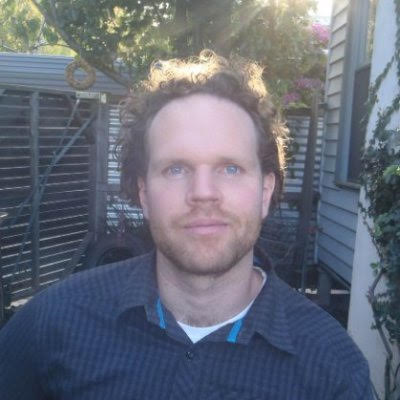Kevin Hayley: Going with the flow
Suzette Chan - 17 April 2020
Kevin Hayley’s geophysics training has taken him halfway across the globe. The University of Alberta graduate (BSc Geophysics 2003) owns Groundwater Solutions in Australia, and works on projects in Australasia, North America, and elsewhere. He told us about how he got to his current position, and about future prospects for geophysics-trained scientists in freshwater and geothermal resources.

Kevin Hayley at his home office in Australia.
Can you tell us what made you choose Geophysics, and about your education and professional career?
As an undergraduate student I did a first year in general Engineering, but was not really drawn to any of the specialties offered. Of the courses I enjoyed, Geology and Physics were the best, so after a gap year to indulge in working at a BC ski resort, I transitioned to Geophysics. After graduation, I spent two years working in mineral exploration field surveys, then returned to university and completed a PhD in Geophysics/Hydrogeology at the University of Calgary. Since finishing the PhD 10 years ago, I have worked as a consultant for projects involving groundwater, first in Calgary, and then in Melbourne, Australia [his wife’s hometown].
I initially set up my company to be able to subcontract back to the consulting job I had in Calgary, but over time, I made contacts around Australia and New Zealand and have gotten to work on many large and complex infrastructure and mining projects.
Can you tell us about your current job?
Currently I am the Director of a small consulting company that specializes in numerical modeling of groundwater flow and contaminant transport. I work on projects in Australia, New Zealand, Canada, USA, and elsewhere to develop numerical models that predict groundwater impacts of projects and guide water resource management decisions.
Do you employ any skills, knowledge, or methods from your time in the geophysics program to your work now?
My particular specialty as a numerical groundwater modeler is model calibration and predictive uncertainty analysis. This analysis is analogous to geophysical inversion, so the skills that I gained in the geophysics program understanding the mathematical representation of physical processes and physical property inference from observation data have been fundamental to my successes.
What part of your current job do you like?
I enjoy the challenge of learning about a new region that each new job presents, also the flexibility and freedom that working as a small company consult allows is great.
What advice would you give to undergraduate and graduate students studying Geophysics?
Think outside the (oil and gas) box. Studying geophysics gives a good background in quantitative analysis that has a wide range of applications.
What developments or trends do you see in the geophysical industry in the coming years?
I see continued need for people with quantitative skills in the water resources sector. Groundwater is the world’s largest freshwater resource. I can also imagine geothermal playing a larger role in the future energy mix with geophysics having a place in development and management of geothermal resources.
This profile is part of our Geophysics Careers series.